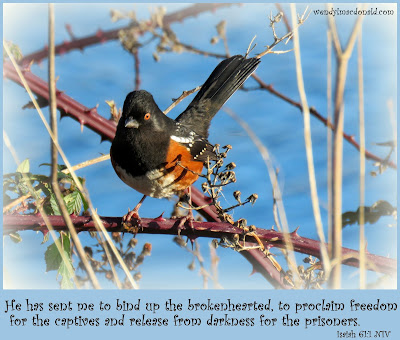First Limerick
During my second year of
teaching, I introduced limericks to my Grade Five class. We studied the rhythm
and rhyme scheme. Then before asking each student to try writing one, we
composed one together. Chuckles and laughter filled the classroom, and my chest
filled with pride for my creative students. I’ve never forgotten it.
There was an old car without tires,
Who always ran over those liars.
When the liars got caught,
The car said, “O gosh!
I’ll never be sold to the buyers.”
There are times I’m inspired by poetry and spin off a well-known (to me) poem. To give a background to the poem below, my InScribe local writers’ group was practising alliteration, onomatopoeia, rhythm, and repetition, using as our model Alfred Noyes’ “The Highwayman” (read it here). One morning, with a sudden inspiration, I began to write my own spin off. I composed half of it in a few minutes, and the rest needed to be thought out carefully day by day. I submitted it to FellowScript, and it was published. You may have read it there.
The Deadline
(Apologies to Alfred Noyes’ “The Highwayman”)
The moon was a missile of motion
Sailing through starlit skies
And the shaft of light through the window
Shone as I typed through my tears
My mind lay bare in the moonlight—
Blank
and bare in the moonlight
And the blood of my veins in the moonlight
Throbbed at my sweated brow
There was pressure at every keystroke
And cross-offs on every dark line
For I couldn’t see through my tears
The direction I should take.
Then softly a whisper I listened
And then I heard the Lord say
Look to me for insight
Watch
for me for insight
I’ll inspire you ‘fore midnight
And nothing can bar your way.
I whispered a prayer of great thanks
As I swirled words and phrases
T’was only God who had done it
Had given me words that I needed
My mind shone with brilliance
My thoughts flew like flickers
And this writer kept writing—
Writing—writing
I kept writing to the dreaded deadline.
And now ere the stroke of midnight
Soft ere the stroke of
midnight
The tip of my finger touched “Send”
The submission at last t’was complete.
And there you have it. Poetry brings images and vividness to life that sometimes can’t be expressed in prose. Poetry elevates our language. I might say that I was inspired to write a poem, but the psalmist began with these wonderful words:
My heart is stirred by a noble
theme as I recite my verses for the king;
my tongue is the pen of a skillful writer.
Psalm 45:1 (NIV)
Image by Tea
time reading poetry










